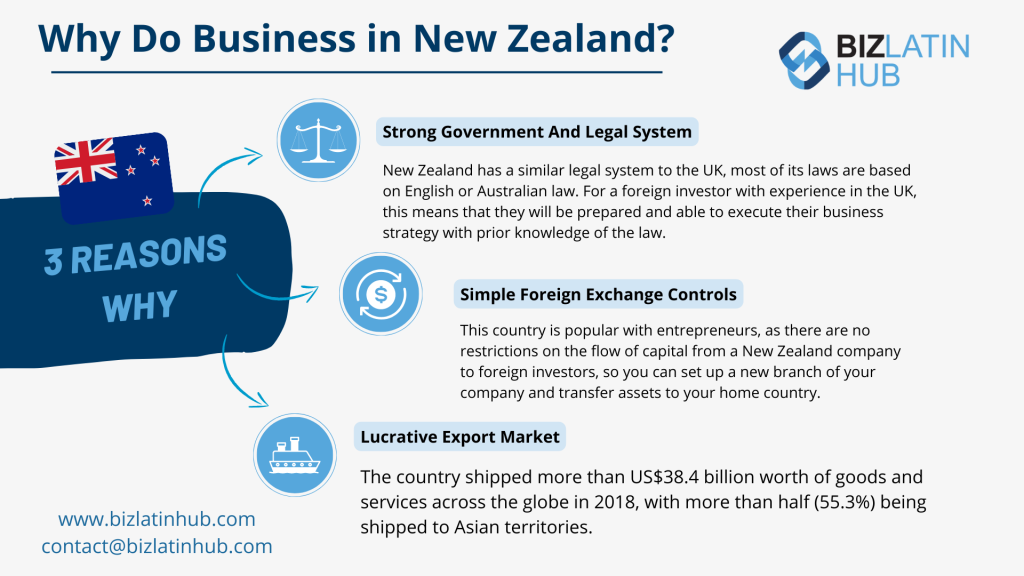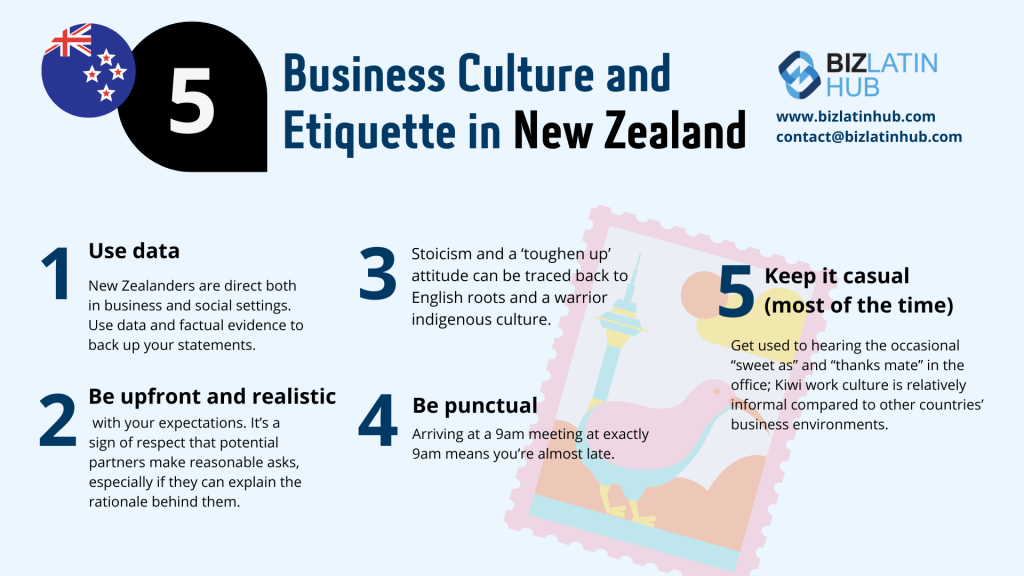While thorough market research is undeniably crucial to business success, achieving success often transcends the mere development of a viable product in the marketplace. Recognizing and respecting the nuances of business culture and etiquette in New Zealand, both professionally and socially, exemplifies your company’s commitment to assimilating the local way of life.
Deepening the values cherished by our South Pacific counterparts lays the foundation for fostering long-lasting, mutually beneficial working relationships. Embracing the unique business culture and etiquette in New Zealand, whether by valuing honesty, fostering egalitarianism or appreciating Maori cultural heritage, can significantly enhance your company’s position in the local marketplace and pave the way for sustained success.
Consider these tips and insights on business culture and etiquette in New Zealand if you want to form a company in the country. Biz Latin Hub can help you in the process from start to finish, as well as offering full back office support for ongoing operations.
Business culture and etiquette in New Zealand
If you’re researching a potential business expansion to New Zealand, you’ll likely have come across some impressive statistics: number one for doing business, second most transparent country, and third freest economy.

The small island nation works hard to maintain a competitive economic edge over others in these and other areas. Its government is welcoming to foreign businesses and investors and provides myriad support mechanisms to market entrants to prove it. Here, though, we explore the business culture and etiquette in New Zealand guiding foreign businesses through their new commercial environment.
Business dynamics
With a largely egalitarian work environment, job titles and rank aren’t as overt in Kiwi business culture as in others. Anyone throwing around their elevated status in the office will undoubtedly lose respect from their modest New Zealand workmates. Rather, the local population generally operates on meritocratic principles, valuing useful ideas and feedback from any and all participants.
Respect physical space
Greetings are initiated with a handshake, and that’s enough for New Zealanders in terms of physical contact at work. Their British heritage shows in their large ‘personal space’ radius.
Though a multicultural society, hugs and cheek kisses are largely absent in the workplace. For a job well done, you might occasionally witness a slap on the back.

Business culture and etiquette in New Zealand: Talk facts and figures
New Zealanders are direct both in business and social settings. Use data and factual evidence to back up your statements. Don’t get in the way of transparency by beating around the bush, or your Kiwi counterparts will lose interest. After all, the country sits just behind Denmark as the second most transparent in the world. If things aren’t clear or informative enough, a New Zealander will say so.
Honesty is the best policy in local business doctrine. Therefore, try not to interpret their ‘no frills’ frankness as rude or harsh.
Keep that in mind for your New Zealand business negotiations: locals won’t be taken for a ride. Haggling isn’t part of commercial culture in the small South Pacific nation, so be upfront and realistic with your expectations. It’s a sign of respect that potential partners make reasonable asks, especially if they can explain the rationale behind them.
Stiff upper lip
Also on loan from their British cousins is a tendency to avoid emotional expression, particularly at work. Though friendly, New Zealanders can be somewhat reserved (at least initially). Lack of emotional restraint is frowned upon in business, and even in social situations. One only needs to observe the country’s revered sports team – the All Blacks – in action, to understand the emotional wavelength many Kiwis sit on.
New Zealanders relax into their working relationships once a solid rapport is established. Until then, avoid personal or sensitive conversation topics.
Be punctual
Despite its South-Pacific island classification, ‘Island time’ doesn’t feature in social or work elements of Kiwi culture. Their laid-back nature doesn’t extend to appointment times; arriving at a 9 am meeting at exactly 9 am means you’re almost late.
Keep it casual (most of the time)
Get used to hearing the occasional “sweet as” and “thanks mate” in the office; Kiwi work culture is relatively informal compared to other countries’ business environments. As mentioned above, you won’t hear New Zealanders address their bosses any differently from their subordinates. Locals usually address each other on a first name basis. In good working relationships, nicknames are even sometimes used.
The de facto dress code is smart casual. However, New Zealanders do have the propensity to dress up for formal occasions or important business dinners. As this is not the norm though, any change in dress code to more formal attire must be clearly communicated.
“Can do”: Where Kiwi ingenuity comes from
New Zealanders are undeniably practically-minded. If pitched ideas and creative solutions will cause problems operationally, they’ll be the first to identify it.
The good news is locals have a world-recognized knack for avoiding these situations. You can rely on a Kiwi to get stuck in and be proactive about solving problems. When a complicated scenario calls for an innovative response, New Zealanders deliver.
The proof is in the pudding: NZ Agritech
Take the country’s booming agritech (agricultural technology) industry as a prime example. Increasing demand for sustainable agricultural practice has seen New Zealand develop world-class innovations and research institutions. Robotic inventions can now evaluate irrigation systems and overall crop health, as well as the readiness of fruit for picking.
Discoveries of how feed components affect the taste of livestock meat have fostered a niche for luxury lamb cuts. Another specific example is Halter’s ‘cow fitbit‘ – a collar to track cows’ health to mitigate threats of disease outbreak. As an employer, your New Zealand staff are proactive, honest and upfront. Utilize your team’s ingenuity and resilience to facilitate an engaged and productive office environment.
Cultural sensitivity goes a long way
Communities and groups from all over the world have found their home in New Zealand. As a result, the multicultural nation places high value on acceptance of alternative world views and perspectives. Be open-minded and tolerant, and you can enjoy the benefits of an educated, diverse workforce.
English is the main language of business and de facto official language for the country. Pay attention, though, and you’ll hear people use a wide variety of languages in different contexts. The indigenous language, Te Reo Māori, receives special attention from the government. Special language and culture maintenance initiatives keep Te Reo Māori alive and connect New Zealanders with their heritage.
Biz Latin Hub can help you understand business culture and etiquette in New Zealand
New Zealand is home to a healthy and diverse economic environment. To take advantage of the country’s optimal business conditions, it’s important to get help expanding into new territory. We can help make sure your commercial expansion runs as smoothly as possible. As locals, we know all about business culture and etiquette in New Zealand and elsewhere.
Biz Latin Hub offers customized business solutions in a number of market-entry and back-office services. This includes company formation and financial services. Our New Zealand team offers expert support to ensure a smooth process for you and your business.
Contact us now and we’ll help you design a strategy to capitalize on your commercial opportunities.






